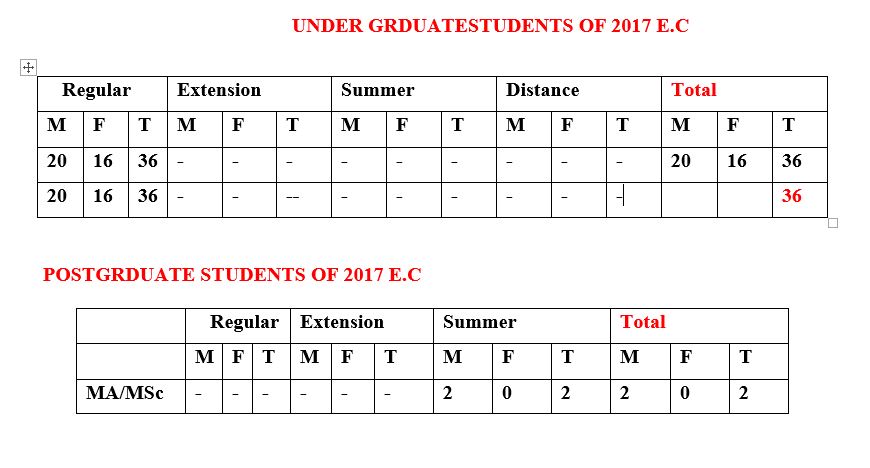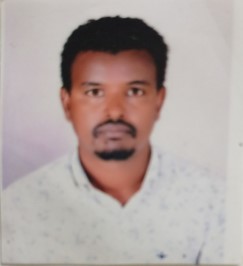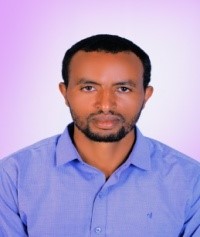BACKGROUND
The Department of Earth Sciences was established in 2007 as part of Wollega University's commitment to addressing Ethiopia's natural resource and environmental challenges. It is recognized as a senior and dynamic unit within the College of Natural and Computational Sciences. With a mandate to advance geoscientific knowledge and address both national and global challenges, the department has built a reputation for excellence in teaching, research, and community services. Since its establishment, the department has undergone significant evolution, starting from running only one program to currently having two undergraduate and two postgraduate programs. The department has played a key role in educating future professionals in geology, geo-informatics, and geophysics while serving as a hub for scientific inquiry and practical applications.
The Department of Earth Sciences at Wollega University is a premier center of geoscience education and research located in Nekemte, Ethiopia. Committed to excellence, innovation, and social responsibility, the department delivers a comprehensive curriculum through its robust undergraduate and postgraduate programs, including B.Sc. degrees in Geology and GIS, and M.Sc. in Exploration Geophysics, GIS and Remote Sensing, Hydrogeology, and a forthcoming BSc degree in Mining Engineering. With state-of-the-art laboratories, dynamic fieldwork opportunities, and modern geospatial facilities, the department equips students with both theoretical knowledge and practical skills essential for addressing natural resource management, environmental sustainability, and disaster risk reduction.
MISSION
The Earth Science Department will develop in each student critical thinking, enthusiasm, initiative, and the necessary skills to become lifelong students of Earth Sciences. Emphasis will be placed on learning basic concepts and techniques through research, in an environment that fosters the development of professionals with a social, cultural, and humanistic sensibility, as well as profound ethical values. In this way, the department will contribute to the enrichment of Geoscience and society through the creation and dissemination of new knowledge through scientific research. The Earth Science Department focuses on:
- Prepare students for professional positions in industry and government and careers in academic research and teaching.
- Increase awareness of Geosciences in liberal arts, education, and other science majors.
- Deliver high-quality education and training by BSc in Geology, Geo-informatics (GIS and Remote Sensing), and by MSc in geophysical exploration, Hydrogeology, and Geo-information systems.
- Build a diverse, highly skilled professional student population that contributes to the sustainable development in all degree programs.
- Foster interdisciplinary collaborations and partnerships with national and international institutions.
- Engage with communities through community service programs that promote environmental conservation and sustainable practices.
VISION
The Earth Science department intends to produce a well-trained and competent geologist and Geo-informatics capable of responding to societal needs by providing the highest levels of education entailing theoretical, practical, fieldwork, and industry attachments and strives to foster an environment in which students learn to think, conduct research, apply knowledge, and achieve success in a diverse and changing global. The Department also aims to achieve national recognition through its education and research programs in geology and geo-information science. To achieve this vision, the department will pursue at least five strategic directions below.
Strategic Directions:
- Create a Department identity that promotes the core and emerging strengths of Geoscience.
- Develop a faculty, staff, and administrative structure equivalent to top-tier PhD and Scientist-granting institutions.
- Establish the well-structured Earth Science Department as the center of excellence in Geosciences and center for research in Western Ethiopia on natural resource identification, planning, management, mining engineering, metallurgy, mineral processing and value addition, environmental issues, disaster risk reduction, and utilize its findings wisely for sustainable development and environmental stewardship.
- Empower innovative and globally significant geoscience research and Technology by creating modern and societally relevant Geoscience research and education programs.
- To be a Department that shares our success with the stakeholders and communities we serve.
COLLABORATIONS AND PARTNERSHIPS
The Department of Earth Sciences, encompassing both Geology and GIS programs at Wallaga University, places a strong emphasis on fostering collaborations and partnerships to enhance academic excellence, research capacity, and community service. One of the department's key collaborators is the Ministry of Mines, which provides invaluable opportunities for joint research, resource exploration, and practical training for students. Through this partnership, the department engages in mineral resource assessments, geological mapping, and sustainable mining practices, contributing to the country's economic advancement.
This collaboration also ensures that students and faculty are exposed to real-world challenges and solutions in the field of geology, creating a bridge between academic knowledge and industry needs. Furthermore, the partnership enables access to advanced geological data, equipment, and expertise, enriching the learning experience while addressing critical national resource management issues.
Another significant partnership is with the Space Science and Geospatial Institute of Ethiopia (SSGI), which supports the department's GIS program by providing cutting-edge geospatial technology, remote sensing data, and training opportunities. This collaboration strengthens the department's capacity to conduct research in areas such as land use planning, environmental monitoring, and disaster management. By working closely with SSGI, the department contributes to national development goals through the application of geospatial science in urban planning, agricultural monitoring, and climate change adaptation.
Additionally, this partnership enables students to gain hands-on experience with satellite imagery, GIS software, and spatial analysis tools, equipping them with the skills needed to address Ethiopia's pressing environmental and developmental challenges. Together, these collaborations ensure that the Department of Earth Sciences remains at the forefront of research and innovation in geology and geospatial science, contributing to the sustainable development of the nation
INTERNATIONAL PARTNERS
- The Lebanese Center for Water and Environment (LCWE).
- IHE Delft Under the Water and Development Partnership Program of the Netherlands.


 Name: Mr. Lemessa Amente Goboto
Name: Mr. Lemessa Amente Goboto Name: Mr. Tola Bulti Geleta
Name: Mr. Tola Bulti Geleta